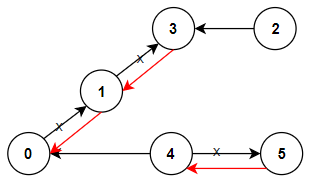There are n cities numbered from 0 to n - 1 and n - 1 roads such that there is only one way to travel between two different cities (this network form a tree). Last year, The ministry of transport decided to orient the roads in one direction because they are too narrow.
Roads are represented by connections where connections[i] = [ai, bi] represents a road from city ai to city bi.
This year, there will be a big event in the capital (city 0), and many people want to travel to this city.
Your task consists of reorienting some roads such that each city can visit the city 0. Return the minimum number of edges changed.
It’s guaranteed that each city can reach city 0 after reorder.
Example

Input: n = 6, connections = [[0,1],[1,3],[2,3],[4,0],[4,5]]
Output: 3
Explanation: Change the direction of edges show in red such that each node can reach the node 0 (capital).
Solution
/**
* @param {number} n
* @param {number[][]} connections
* @return {number}
*/
var minReorder = function (n, connections) {
//reorienting some roads such that each city can visit the city `0`. Return the **minimum** number of edges changed.
//create a graph
const graph = new Array(n).fill().map(() => []);
//add the connections to the graph
for (const [v1, v2] of connections) {
//add the connection to the graph
graph[v1].push(v2);
//add the connection to the graph
graph[v2].push(-v1);
}
//start at node 0
const queue = [0];
//add node 0 to the visited set
const visited = new Set([0]);
let ans = 0;
//while the queue is not empty
while (queue.length > 0) {
//get the current node
const node = queue.shift();
//loop through the neighbors
for (const neighbor of graph[node]) {
//if the neighbor is not visited
if (!visited.has(Math.abs(neighbor))) {
//add the neighbor to the visited set
visited.add(Math.abs(neighbor));
//if the neighbor is positive, increment the answer
if (neighbor > 0) ans++;
//add the neighbor to the queue
queue.push(Math.abs(neighbor));
}
}
}
return ans;
};